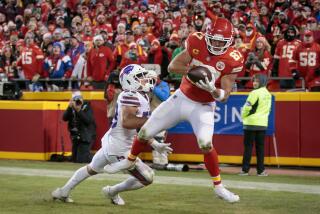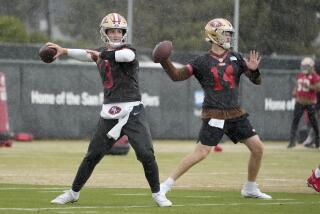A Key Intangible: Smart Play Calling
Of the 30 NFL teams, the three that seem to be playing the best football this season have shared one intangible advantage. Their play selection has in general has been more sophisticated than their opponents’.
In recent games, well-called plays have assisted each of them, the Green Bay Packers, San Francisco 49ers and Dallas Cowboys.
On first downs this month, for example, for as long as winning and losing remained in doubt, those three teams all threw the ball more often than they ran it.
And in NFL games, that helps.
For, illustrating the power of smart play selection, NFL passers almost always benefit from the kind of defense they encounter on first down, when defensive teams regularly overload against running backs.
In any case, on first down, the defense must think both run and pass.
By contrast, defensive teams usually think pass on third down, unless, of course, it’s third and short. Combining blitzers with rushing linemen, they get more sacks on third and 10 than first and 10. Many more.
Although all that seems elemental, it is apparently a hard lesson for most pro clubs to learn.
Thus in Kansas City a week ago, when the struggling Chiefs held a third-quarter lead of only 7-0, the Oakland Raiders came up to first and goal at the Kansas City three and as usual asked a running back to hit the Chiefs’ eight-man line. Result: minus two yards.
Then on second and goal at the Kansas City 5, the Raiders called the predictable pass. Results: blitz, fumble, and an 80-yard return that changed a possible 7-7 game into a 14-0 game and led Oakland to an 0-2 record.
Play-calling, which that time made the difference again, continues to be the most underrated of NFL intangibles.
*
Long argument: Matt Millen, the Fox announcer who as a linebacker once helped the 49ers win a Super Bowl, expressed one point of view last week when he said third is the most important down in football.
“Whoever wins the most third-down plays wins the game,” he said.
Since Millen’s 49er days, we have been arguing with him about that. For, plainly, first is usually the critical down. Here are the differences:
--With shrewd first-down passes, NFL coaches can keep their teams out of third down, or at least out of third and long.
--First is a coaches’ down. Strategically, good offensive coordinators treasure the surprise value of that down, when all defensive teams must worry about every play the offense has, every pass and run.
--Third is an athletes’ down. The best players tend to prevail then with either a strong pass rush or a strong-armed pass.
The truth is that, on first down, it’s hard for great defensive players to plot against a running back--against Dallas’ Emmitt Smith, say, or Green Bay’s Edgar Bennett--and still be ready for a pass by Troy Aikman or Brett Favre.
Whenever football personnel is reasonably competitive, it can be shown that the surest way to win is to do something unexpected. And that often means passing on running downs and running occasionally on a passing down.
*
Math time: Sports fans missing the opportunity to play tennis or golf today, or croquet, can instead play an indoor game at their television sets. It’s easy: Count the number of first-down passes and runs called by opposing football coaches.
During the periods last week when the TV games were on the line--and that was a week that was characteristic of the season--the teams that threw most frequently on first down won the day.
In a typical instance, the undefeated 49ers in one stretch called passes on nine consecutive first-down plays and on 12 out of 14. The running Rams were soon out of contention.
In another instance, the Chicago Bears lost the way the Raiders lost the same day. At the Washington 14-yard line, the Bears tried to run on first and second downs, then tried to pass on third and long, when they were blitzed, sacked and hustled out of field goal range.
What the Bears, Raiders and other losers all learned, or should have learned, is that in close games, perceptive play selection is likely to be decisive.
More to Read
Go beyond the scoreboard
Get the latest on L.A.'s teams in the daily Sports Report newsletter.
You may occasionally receive promotional content from the Los Angeles Times.










